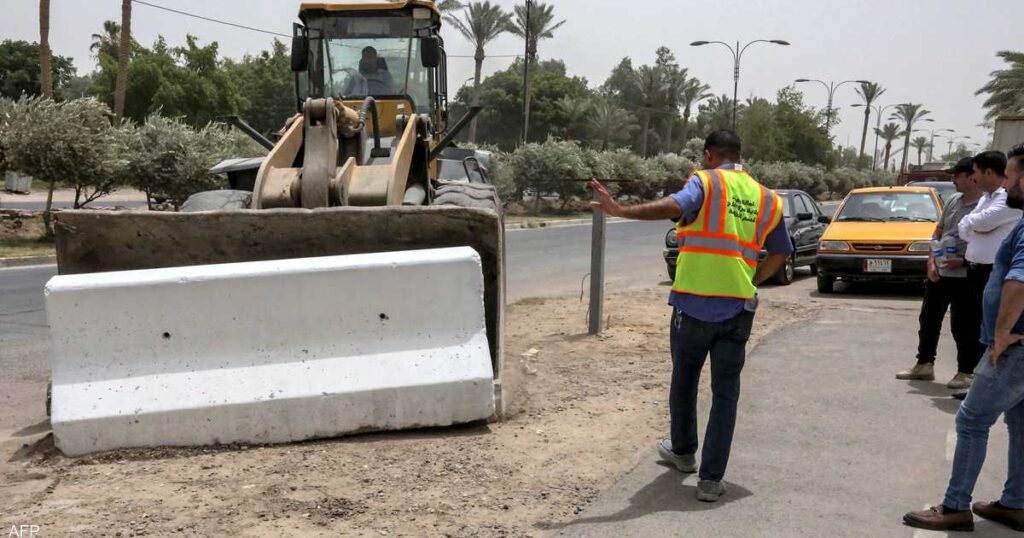Since the beginning of this month, thousands of Muqtada al-Sadr’s followers have stormed the Green Zone, in central Baghdad, and held an open sit-in in the parliament building, while supporters of the coordination framework staged a sit-in in the Jadriya area, as part of a severe political crisis that has spanned 10 months.
Over the past years, the Iraqi security forces have used concrete barriers to block roads and prevent attacks by extremist organizations, as well as use them to close some areas in anticipation of protesters entering them on several occasions, such as the 2019 demonstrations.
Due to the presence of human density in the Green Zone and the surrounding cities, the military forces resorted to deploying hundreds of concrete barriers in several locations, such as the General Secretariat of the Council of Ministers, near the Supreme Judicial Council and the Parliament building.
temporary procedure
A source in the Iraqi Joint Operations Command told “Sky News Arabia” that “the purpose of these checkpoints is to keep the demonstrators away from some sensitive areas where they should not be, and to cut off the roads leading to the main government headquarters, which is a temporary measure, as some of these can be removed.” The checkpoints after the end of the current sit-ins,” noting that “the traffic inside the Green Zone was not affected by these cuts, because it is far from the main streets.”
The source, who refused to reveal his name, confirmed that “the security forces cannot be used to block some roads, and to establish station wagons for the logistical support they need, so this type of measure is resorted to, as the security forces have restored dozens of checkpoints so far, with the launch of The demonstrations, and it is expected in the coming days that more precautionary measures will be taken.”
The sit-ins of Muqtada al-Sadr’s supporters were concentrated in the heavily fortified Green Zone, which is located on the western bank of the Tigris River, which bisects Baghdad on two sides. They are the eastern al-Rusafa and the western al-Karkh, and on the other side of the river are the neighborhoods of Bab al-Sharqi, al-Bataween and al-Karrada al-Sharqiya.
popular discontent
On the other hand, Iraqi citizens expressed their dissatisfaction and annoyance with the return of these barriers to the streets and cities of the capital, after they got rid of them over the past two years, especially the center of the capital, such as the Green Zone and its environs, to add another burden to the residents there and impose on them a specific road map. .
Abu Muhammad al-Obaidi (50 years), from the Green Zone, in the capital, Baghdad, confirmed that “the situation is worrying, and the security moves are rapid, with the return of checkpoints in some streets, and the return of concrete barriers, as well as strict procedures at night regarding entry and exit to some streets that It includes government facilities or headquarters.
Al-Obaidi, speaking to “Sky News Arabia”, said that “a state of mistrust prevails in the atmosphere of Baghdad due to the political hostility and the unknown state to which we are heading, the absence of solutions on the horizon, and the adherence of all parties to their position, as well as the return of the old security measures, which gives a clear indication of the reality of the city.” Which is very tired.”
Since the military operations against ISIS stopped at the end of 2017, the Iraqi forces began a wide campaign to open closed roads and remove concrete barriers that were hanging over the airspace of the capital, Baghdad.
Some residents of the capital, Baghdad, resorted to the Kurdistan region to spend the summer vacation and escape from the reality of the capital, in light of the frequent power cuts and the escalation of political disputes.
One of the hardest decisions
In turn, the Executive Director of the Nama Media Corporation, Rahim Al-Shammari, believes in an interview with “Sky News Arabia” that “the return of concrete barriers is one of the most difficult decisions on the psyche of the Iraqi citizen, as well as one of the worst decisions taken by the military institution, especially since this method of work has not been proven Its success can easily be bypassed.
He added, “It is not possible to confront the demonstrators with such barriers, and it will establish a great isolation between officials and citizens, and will even affect the psyche of the citizen, and give an image of the darkness of life, in light of the complex political conditions.”
The Independent Research Group, which is the sole representative, of the Gallup International Center, in Iraq, conducted a poll it published a few days ago, which said that only 17 percent of Iraqis believe that their country is moving in the right direction, which gives an indication of a non-optimistic view prevailing among Iraqis about the future of their country. .

